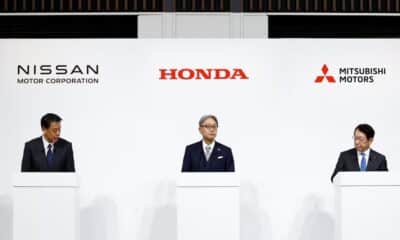news
Exploring the Possibility of a Honda Nissan Merger and Its Impact on the Automotive Industry
A merger might have to happen between Honda and Nissan. The idea of a partnership between both companies would markedly modify the surroundings in the industry; both are major players in the global market. The implications of such a merger, the current state of Honda and Nissan, and the role of Mitsubishi within these discussions are discussed, and how Honda’s stock performance and market positioning can be analyzed is discussed.
The Background of Honda and Nissan
Honda and Nissan are the two most famous names in the automobile world. We are all proud of Honda for its engineering excellence and diverse product lineup of cars, motorcycles, and power equipment. Nissan is well known for its electric vehicles (EVs) and advanced driver-assist systems. The two companies have a solid global presence and are committed to sustainability and technology.
Nissan-Honda Merger Talks: What’s at Stake?
Every few years, there have been rumors that Nissan and Honda are in merger talks. The idea of combining resources and expertise could lead to:
- Increased Market Share: Honda and Nissan could jointly capture a larger share of the global auto market, competing with other big players such as Toyota and Volkswagen.
- Cost Efficiency: A merger could create a more streamlined operation, lower manufacturing costs, and increase supply chain efficiency.
- Technological Advancements: Pooling EVs, hydrogen fuel cells, and autonomous driving research and development could speed up innovations in the sector.
- Stronger Global Presence: This would enable the companies to enter new markets whilst maintaining their traction within existing markets.
These infusions include Serious pitfalls, cultural clashes, integration complexities, and legislation hurdles.
Mitsubishi in the Equation.
As a key partner in Renault Nissan Mitsubishi Alliance, which has been enormously successful in promoting collaboration and innovation between the three companies, Mitsubishi is an essential member of the alliance. In such a case, Honda would collaborate with Nissan and learn from the alliance’s success below, but it also would require Mitsubishi’s role to be key to its success because this expanded partnership would have to be. Combining the strengths of both Honda and Nissan with Mitsubishi’s expertise in plug-in hybrid technology and its presence in these emerging markets ensures a match made in heaven.
Honda Stock: A Reflection of Market Sentiment
Honda stock trends give good insights into a company’s finances and investor confidence. Honda stock has remained resilient over the past year despite the world’s economic uncertainties and supply chain disruptions. Key factors influencing Honda’s stock include:
- Strong Product Portfolio: Honda’s various SUV models, such as the CRV and Accord, still drive sales significantly.
- Focus on Electrification: Investors are also pleased that Honda has committed to achieving carbon neutrality by 2050 and has invested in EVs.
- Strategic Partnerships: Honda’s competitive portfolio includes plug-and-play efforts with other automakers and tech companies.
A deal with Nissan kicked merger talk into gear, which could increase interest in and valuation of Honda stock.
What would a Nissan-Honda Merger imply?
A merger between Nissan and Honda would undoubtedly have far-reaching implications for the automotive industry:
- Competition: This would strengthen Honda-Nissan, making rival automakers like Toyota, Ford, and General Motors compete more aggressively.
- Innovation: This would create a combined potential of resources for breakthroughs in EV technology, which companies could use to comply with strict emissions regulations and meet the growing demand for sustainable vehicles.
- Consumer Impact: A wider range of innovative, high-quality vehicles at competitive prices would benefit customers.
- Global Strategy: The merger might help enter untapped markets, especially in South America, Asia, and Africa.
Challenges and Risks
While the prospects of a Honda-Nissan merger are exciting, there are significant challenges to consider:
- Cultural Integration: Honda and Nissan have significant corporate cultures that could intertwine to allow all to run smoothly or come into conflict.
- Regulatory Approvals: Antitrust laws would be an obstacle, and many jurisdictions would need to approve the project.
- Financial Risks: Integration costs can be costly in the short term, and other prospective projects, including those developed in cooperation with government agencies, could bear such costs.
- Stakeholder Concerns: For long-term success, it would be critical to balance shareholders, employees, and customers.
Conclusion
A merger between Honda and Nissan, or the current collaboration between the two, would have both sides thinking about what’s advantageous and what’s not. A combination could result in a company that can transform the automotive industry with innovation and more global reach. Still, it may also come with challenges to overcome – a diversified portfolio would involve overcoming challenges to the extent that careful planning and execution can successfully overcome them. It’s possible to combine both companies, given that Honda has a stock performance to fall back on and focus on sustainability.
Throughout the discussions, Mitsubishi and other stakeholders will be significant factors in how things play out. The speculation over whether this merger will happen shows how the automotive industry is a dynamic market of growth and innovation by the leading players.

-

 General3 weeks ago
General3 weeks agoWhy My Wife is Yelling at Me: Understanding the Reasons and Finding Solutions
-

 Tech3 weeks ago
Tech3 weeks agoAshen Slate Blue Nike Tech Outfit: Style, Comfort, and Performance
-

 news2 weeks ago
news2 weeks agoXNX XNX Transmitter Installation Manual A Complete Guide
-

 Health & Beauty2 weeks ago
Health & Beauty2 weeks agoUnderstanding Jackson County Nutrition and the Mode of Nutrition for Archera
-

 news2 weeks ago
news2 weeks agoExploring the Possibility of a Honda-Nissan Merger and Its Impact on the Automotive Industry
-

 Travel1 week ago
Travel1 week agoExploring the Majesty of Curtain Falls in BWCA
-

 Travel6 days ago
Travel6 days agoThe Traveler Hired the Wrong Tour Guide: How to Avoid Common Travel Mistakes
-

 General1 week ago
General1 week agoTransform Your Bathroom with Stunning Floral Shower Curtains




